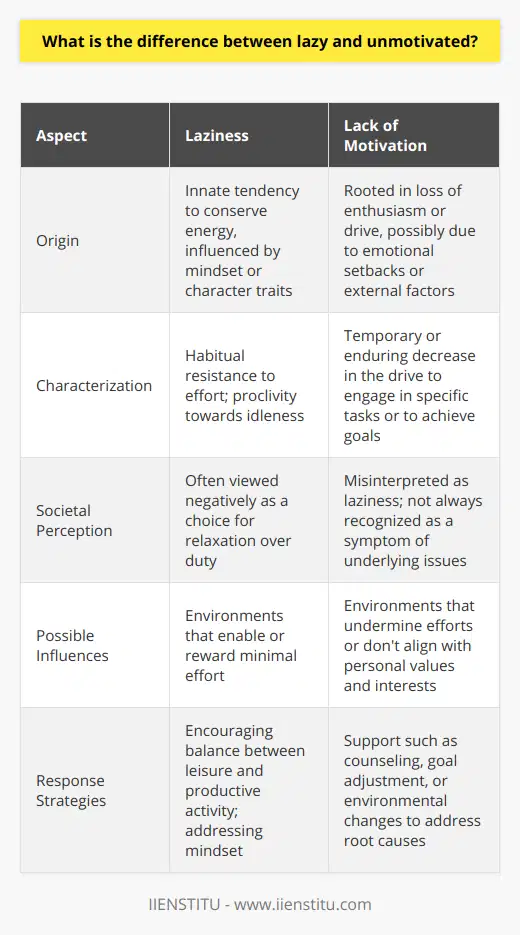
The business world is full of stress. Every employee knows this, especially those who want to move up or are looking for a job. Burnout syndrome has become quite common nowadays among almost all people, including workers and students. Students complain of feeling tired or even discouraged after spending important years of their lives seeking knowledge.
What is the problem? Isn't that what they've been waiting for? What causes them to feel this way? How can you avoid falling into the trap of laziness and exhausted life? Read on for answers to questions like these!
What is Laziness?
People often think that lazing around all day is tantamount to being lazy. This is wrong. Laziness means you are too tired to do anything. Going to school or work takes a lot of effort for you. If you want to get good grades, you need to work hard, work on projects even when you're too tired so you can keep up with the class schedule, or get college assignments done when you're feeling tired from all the work and deadlines for the semester.
Sometimes laziness can be attributed to laziness, but other times it is because the person is exhausted. There's a huge difference between being lazy and feeling academically drained. Let's continue with the burnout syndrome to find out what this difference is.
What is Burnout Syndrome?
This type of syndrome affects students who stay in school too long. Burnout is basically the condition of an individual who has been under too much pressure for long periods of time. It's like you work at a fast food chain where your workload doubles on Monday, triples on Tuesday, and keeps increasing until your schedule gets that tight. Let's talk more about burnout syndrome to be enlightened;
Symptoms of burnout include lack of concentration, loss of enthusiasm, inability to be creative, persistent feelings of hopelessness and helplessness, poor grades despite intense training, absenteeism, frequent illness or illness due to reduced immunity, lack of sleep or rest. It is a state of depression. A person suffering from burnout often feels that there is no end to their suffering.
So what's the difference between being lazy and experiencing burnout? Knowing someone's symptoms lets you know if you have them, so be sure to jot them down. Laziness often results in a person not putting in enough effort while studying, doing projects, or working on papers. When asked about your sudden change in behavior, "I'm just taking a break" might be an answer.
On the other hand, burnout can be attributed to long working hours with little or no breaks. The person loses interest in socializing with friends and even meeting family members for lunch becomes tiring. When you feel academically drained, consider: Could your current situation put you in a situation where you can no longer tell the difference between laziness and burnout?
Could the condition have become chronic? If you're really experiencing burnout, maybe it's time to take a break! Note how students drop out academically, even after being admitted to reputable universities. What could cause this? Is it because these students are too lazy to work hard for their degrees, or because they are pushed beyond the limits of their endurance by overworking? Maybe these people have given up on education, but many will say that education is not just about acquiring knowledge… It is more than that. Education changes lives, don't underestimate its power!
To learn more about Burnout Syndrome, you can attend the Burnout Syndrome training at the Institute. Here you will learn the symptoms in more detail and you will get information from the specialist about how you can prevent it.
What are the Differences Between Laziness and Burnout Syndrome?
If you're lazy, of course, it may have to do with your personality. So you can always have a low energy level. It's bad to feel this way. Because being lazy and being lazy are two very different things. But there are very important differences between laziness and burnout syndrome.
Burnout syndrome occurs not because of laziness, but when you can no longer find the motivation to do something in yourself. On the contrary, sloths can be active. So instead of working, they can do things like play computer games. But a person with burnout syndrome has no desire to do something. It just acts depressingly.
For example, while lazy people are having fun, a person with burnout syndrome can get angry very quickly and go into crying fits. He does not pay attention to his eating and drinking. Even if her phone rings, she stops looking. So there is a big difference between laziness and laziness. It can be said that mental and physical fatigue outweighs.
When you're tired, you run out of energy and you don't want to do anything. Conversely, sometimes even if you feel lazy, there are times when you still want to do something but procrastinate, or you lose motivation halfway through a task or project, causing you to not finish it on time.
Do you think it's possible that some people are both lazy and exhausted?
Yes, it's possible to be both exhausted and lazy at the same time. If you are someone who always procrastinates, but instead of studying the day before the exam like most students, you find yourself surfing social media and playing computer games until late in the evening, the situation is serious. If you are a lazy and exhausted person, you are now in the last and serious stage of burnout syndrome. In this case, it would be the best decision to seek psychological support.
If you are academically exhausted, it may mean that your interest in learning has been lost, or that you have been pushed beyond the limits of endurance due to overwork and stress. In this case, what you need to do is to improve yourself to find the motivation you are looking for. NLP Education or Life Coaching Training may be good options for you. You can attend these online trainings at the Institute and improve yourself to feel better.

Frequently Asked Questions
What is laziness?
Laziness is procrastinating when you have a task to do and instead doing things that waste your time.

What is burnout?
Burnout is the feeling of not doing anything because of too much workload. It leads to depression.
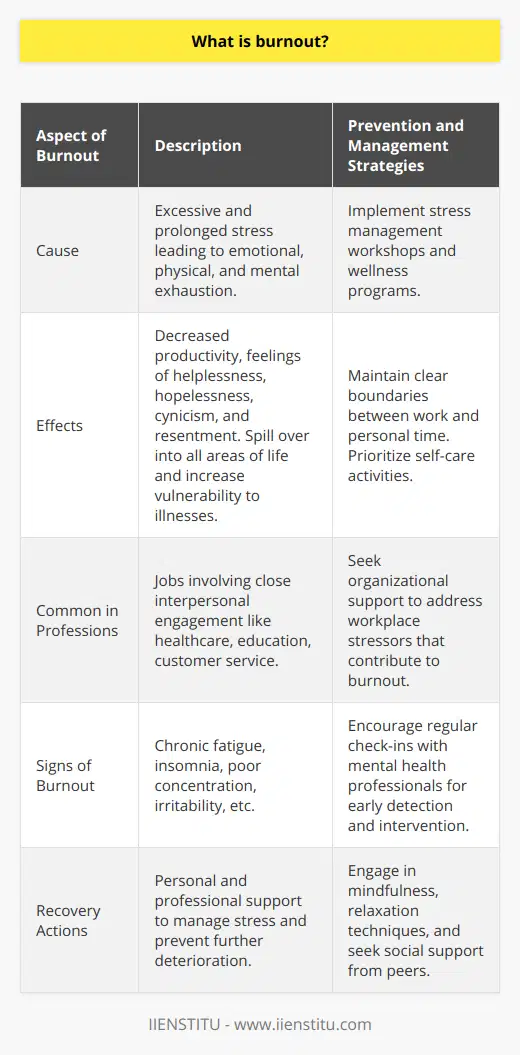
What are the differences between laziness and burnout?
What distinguishes laziness from burnout syndrome is often the absence of symptoms of depression.
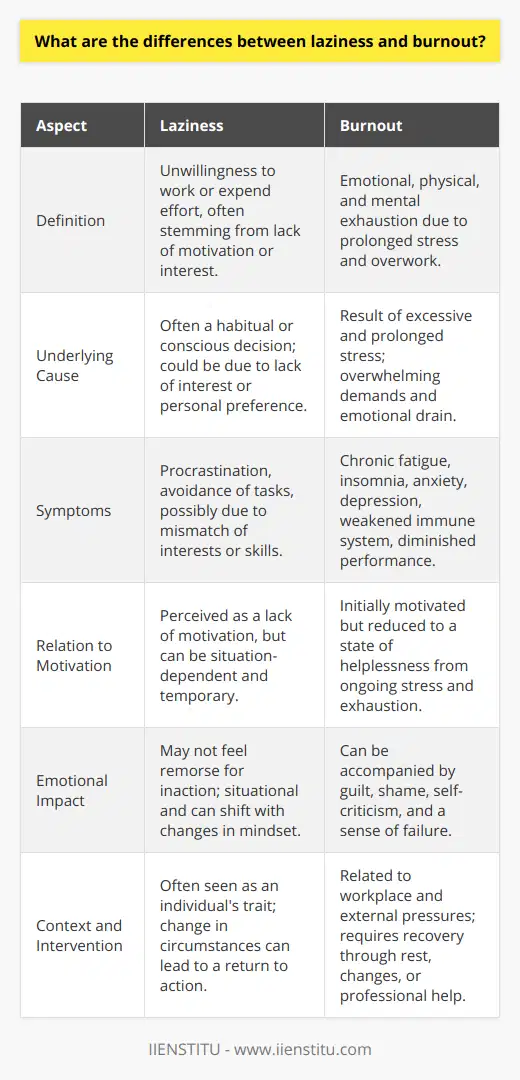
Am I lazy or mentally exhausted?
Identifying Laziness versus Mеntаl Exhaustion
Comparing Symptoms
In order to determine whether an individual is experiencing laziness or mental exhaustion, it is helpful to compare the symptoms of each. Laziness may manifest as procrastination, lack of motivation, or unwillingness to take action. In contrast, mental exhaustion is characterized by persistent fatigue, reduced concentration, irritability, and the inability to cope with daily tasks.
Factors Contributing to Mental Exhaustion
There are numerous factors that can contribute to mental exhaustion. These may include excessive workload, chronic stress, lack of sleep or physical rest, and personal or relational issues. The presence of these factors can create a cycle of burnout, ultimately resulting in prolonged mental exhaustion.
Pay Attention to Lifestyle Choices
One's lifestyle choices can heavily influence the likelihood of experiencing laziness or mental exhaustion. Poor diet, lack of exercise, and insufficient sleep can exacerbate mental fatigue, while increasing the tendency to engage in lazy habits. By addressing these lifestyle choices, individuals can improve their overall well-being and potentially reduce feelings of laziness or mental exhaustion.
Seek Professional Help
If an individual is unable to differentiate between laziness and mental exhaustion or struggles to overcome either issue, seeking professional help may be beneficial. Mental health professionals can provide guidance and support, as well as assess for any underlying mental health conditions that may be contributing to feelings of fatigue or lethargy.
Take Scheduled Breaks
To prevent mental exhaustion, it is important to take regular breaks throughout the day. These breaks can involve short periods of physical activity, mindfulness exercises, or simply unplugging from technology. This strategy allows the brain to recharge, reducing the risk of burnout and increasing overall productivity.
Practice Self-Compassion
Regardless of whether an individual identifies as lazy or mentally exhausted, practicing self-compassion is essential. Acknowledging one's limits and needs, as well as maintaining realistic expectations, can help reduce unnecessary stress and create a healthier relationship with oneself.

How do I know if I am lazy?
Assessing Personal Laziness
To determine if one is truly lazy, it is essential to firstly evaluate one's motivation levels. Are you easily demotivated or lack interest when it comes to engaging in tasks that require mental or physical effort? Assess the frequency with which you procrastinate and put off tasks, as habitual procrastination can indicate a significant issue with personal drive and determination.
Effect of Environment
Analyze the impact of your surroundings on your work ethic. Are you in a stimulating and supportive environment that encourages and challenges you to achieve your goals, or are you surrounded by factors that contribute to demotivation and inactivity? Often, environmental factors can exacerbate perceived laziness.
Comparing to Others
Take a moment to observe others around you, whether they are your peers, colleagues, or friends. Do they exhibit similar levels of drive and motivation, or are you seemingly falling behind in terms of effort and involvement? This social comparison, while not always the most accurate measure, can provide some insight into how your work ethic may be perceived by others.
Reactions to Failure
Furthermore, consider your responses to setbacks and failures. Are you inclined to give up quickly and shy away from challenges that may be perceived as difficult? A reluctance to persevere or embrace failure as an opportunity for growth can be indicative of a lazy character trait.
Prioritizing Activities
Another aspect to consider is the way in which you prioritize and allocate your energy to different activities. Assess whether you are dedicating appropriate amounts of focus and effort to the most important aspects of your life, such as career or personal growth, rather than allowing distractions to consume your time and energy.
Achieving Goals
Lastly, reflect upon your history of setting and accomplishing goals. Have you been successful in meeting objectives that you have set for yourself, or is there a pattern of unmet goals due to a lack of genuine effort? Continually falling short in this area is a strong indicator of laziness.
Conclusion
Ultimately, knowing whether one is lazy requires an honest and thorough self-assessment of one's motivation, environment, comparison to peers, reactions to failure, prioritization of activities, and degree of goal attainment. It is critical to evaluate these various aspects in order to make a well-informed and objective judgment of your inherent laziness or lack thereof.
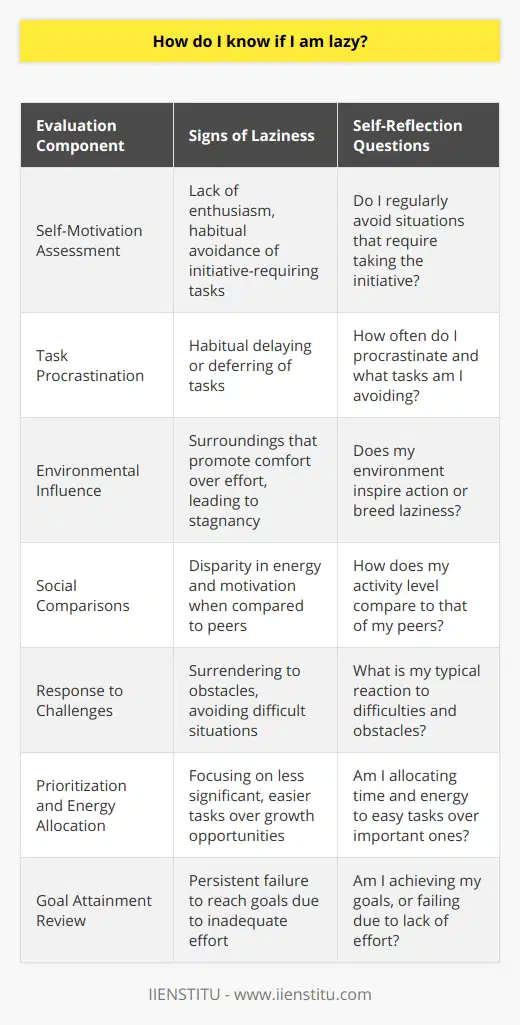
Do I hate my job or am I just burned out?
Assessing Job Dissatisfaction
The question of whether one 'hates' their job or is simply experiencing burnout requires a nuanced analysis based on individual feelings, circumstances, and professional environments. Contextual understanding of the work environment, personal values, and available support are crucial elements when evaluating a negative job experience.
Understanding Burnout
Burnout is a prevalent occupational phenomenon that involves emotional exhaustion, cynicism, and reduced personal accomplishment due to long-term exposure to professional stressors. This leads to a decline in performance, productivity, and well-being. Burnout can occur in any profession and is not dependent on the nature of the work itself; rather, it is a result of unaddressed stress and excessive workloads.
Recognizing Job Mismatch
On the other hand, a person may inherently dislike their job due to a mismatch between the responsibilities, work culture, or overarching objectives of the role and their personal values, interests, or skills. Feelings of frustration, discontent, and detachment may point to an unsuitable profession, fueled by a sense of dissatisfaction unrelated to stress levels or burnout.
Identifying the Source
Differentiating between burnout and general job hatred involves reflecting on the aspects of the job that induce discontent. If dissatisfaction stems from workplace stress or excessive demands, burnout is more likely. Conversely, if negative feelings persist irrespective of workload or stress, job mismatch may be the issue at hand. Self-reflection on personal values and motivations can shed light on the cause of dissatisfaction.
Taking Steps for Improvement
Whether one experiences burnout or job mismatch, there are actionable steps that can improve job satisfaction or facilitate a successful transition to a more fulfilling career. For burnout, seeking organizational support, setting boundaries, prioritizing self-care, and developing healthy coping strategies can create a sustainable work-life balance. For job mismatch, engaging in self-assessment, seeking career counseling, and exploring alternative career paths can guide individuals toward a more fitting work environment.
In conclusion, understanding the underlying cause of job dissatisfaction—be it burnout or job mismatch—is critical for finding a solution that can ameliorate negative feelings and support professional growth. By engaging in self-reflection and seeking appropriate resources and support, individuals can take steps toward improving their job satisfaction or finding a more suitable career path.
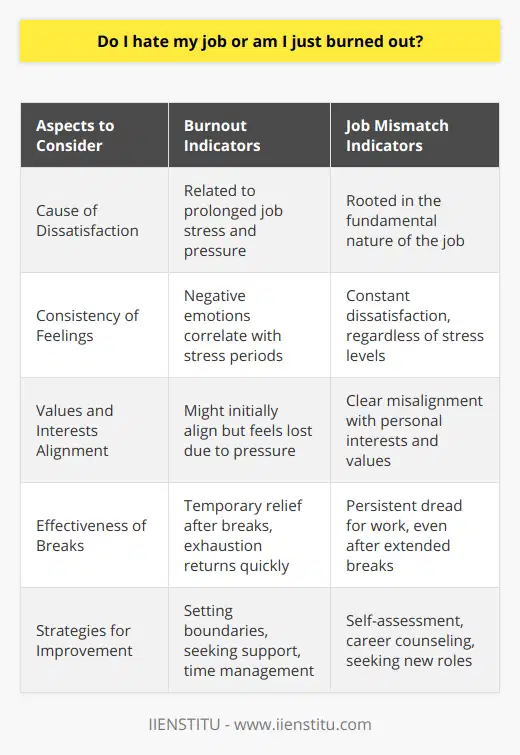
What is the difference between laziness and rest?
Laziness vs. Rest: Understanding the Differences
Distinguishing Factors
The difference between laziness and rest lies in their purpose, intention, and outcomes. Rest is a necessary and intentional break for the purpose of rejuvenation, while laziness is the inability or unwillingness to engage in necessary tasks or responsibilities. Understanding the distinctions between the two can help guide individuals in making healthy decisions regarding productivity, well-being, and self-care.
Significance of Rest
Rest plays a vital role in maintaining physical and mental health. Adequate sleep, taking breaks, and engaging in leisurely activities alleviate stress, improve cognitive performance, and support emotional well-being. Rest is essential in preventing burnout and fostering long-term productivity. In contrast, laziness does not offer these beneficial outcomes.
Negative Impacts of Laziness
Laziness, on the other hand, hinders productivity and personal development. It is characterized by procrastination, lack of motivation, and avoidance of responsibilities. This behavior can lead to heightened stress and anxiety as tasks accumulate or remain unfinished. Moreover, perpetual laziness may contribute to underlying psychological factors or mental health issues, which can further impact an individual's quality of life.
Choosing a Balanced Approach
It is essential for individuals to recognize the differences between rest and laziness to strike a healthy balance in their lives. Rest should be viewed as a necessary component of self-care, allowing for recuperation and effective functioning. In contrast, individuals must acknowledge and address instances of laziness to maintain productivity and personal growth.
In summary, rest and laziness are distinct concepts, each with unique implications for personal wellness and productivity. Through understanding these differences, individuals can make productive, healthy choices to manage their time effectively and foster overall well-being.
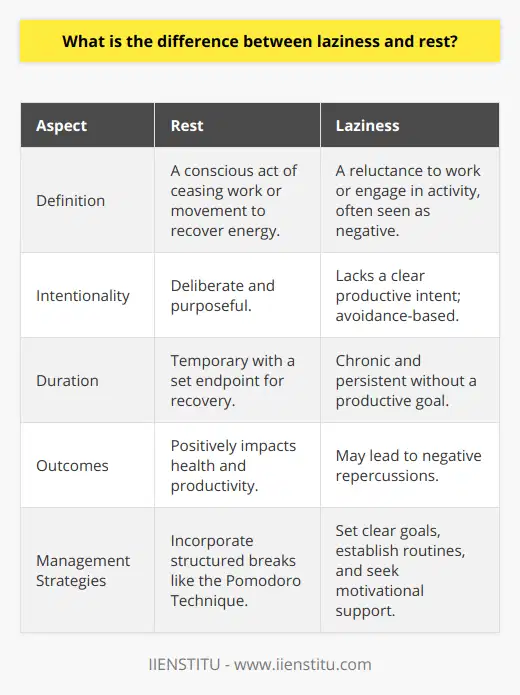
How can I distinguish between burnout and a lack of motivation?
Understanding Burnout and Lack of Motivation
Defining Burnout and Motivation
To distinguish between burnout and a lack of motivation, it is crucial to understand their definitions. Burnout is a state of mental, emotional, and physical exhaustion due to prolonged stress, while motivation refers to an individual's drive and enthusiasm to achieve a goal.
Recognizing Symptoms of Burnout
People experiencing burnout often exhibit physical symptoms, such as fatigue, headaches, and a weakened immune system. They might also face emotional distress, such as irritability or a sense of alienation. Additionally, burnout can be characterized by reduced work performance, cynicism, and a lack of accomplishment. Individuals who feel burned out might withdraw from their social or professional lives, leading to isolation and, in severe cases, depression.
Identifying Lack of Motivation
A lack of motivation, on the other hand, is characterized by a diminished desire to achieve a goal or complete a task, accompanied by decreased energy and focus. Individuals with low motivation might procrastinate or struggle to maintain discipline and interest in their pursuits. However, this absence of motivation might stem from various causes, such as a misalignment of personal values with the task or goal, excessive stress, or an unclear or unrealistic vision.
Comparing Symptoms and Causes
To distinguish between burnout and a lack of motivation, compare the symptoms and causes. Burnout is generally caused by excessive stress and manifests in physical, emotional, and cognitive symptoms affecting various aspects of life. Lack of motivation, meanwhile, often stems from a misalignment of personal values, insufficient drive, or unclear goals, and manifests primarily in behavioral changes related to task completion.
Implementing Appropriate Interventions
Once the cause of burnout or lack of motivation is identified, appropriate interventions can be implemented. For burnout, strategies might include seeking professional help, practicing self-care, finding a healthy work-life balance, and trying relaxation techniques. For individuals who lack motivation, finding purpose, setting clear goals, breaking tasks into manageable parts, and seeking support from others can prove helpful.
In summary, distinguishing between burnout and a lack of motivation involves understanding their definitions, recognizing their symptoms and causes, and implementing appropriate interventions. Gaining clarity in these areas allows for effective handling of each issue, promoting overall well-being and success.
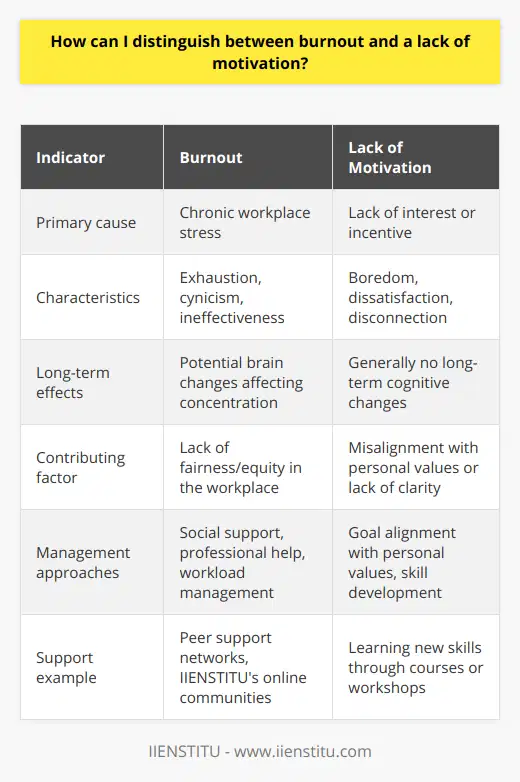
Are there specific signs to identify if I'm experiencing mental exhaustion or simply procrastinating?
Identifying Mental Exhaustion vs. Procrastination
Mental exhaustion and procrastination can appear similar, but identifying the specific signs can help differentiate between the two. Mental exhaustion, also known as burnout, occurs when a person becomes overwhelmed by stress and mental fatigue, leading to a decline in motivation, cognitive abilities, and productivity. Procrastination, on the other hand, refers to the act of delaying tasks to choose more pleasurable activities, even when it is detrimental to performance and well-being.
Symptoms of Mental Exhaustion
Individuals experiencing mental exhaustion can exhibit various symptoms, including constant fatigue, irritability, trouble concentrating, and a decrease in work performance. They may find it challenging to complete everyday tasks, struggle to make decisions, and experience physical symptoms such as headaches, muscle pain, and sleep disturbances. Emotional signs may consist of feelings of helplessness, sadness, anxiety, and loss of interest in previously enjoyed activities.
Indicators of Procrastination
Procrastination can be identified by a few specific signs, such as the unwillingness to begin tasks based on difficulty, time requirement, or negative associations. Individuals who procrastinate might underestimate the time a task requires, leading to poor time management and missed deadlines. They may make excuses, choose easier tasks over essential ones, or abandon tasks before completion. Moreover, feelings of guilt, anxiety, or frustration often accompany the act of procrastination.
Determining the Underlying Cause
To determine whether an individual is experiencing mental exhaustion or procrastination, it is essential to analyze the reasons behind the observed behavior. If the lack of motivation is due to a prolonged period of high stress, excessive workload, or emotional turmoil, mental exhaustion might be the cause. In contrast, if the individual delays tasks to avoid discomfort, choose more pleasurable activities, or due to poor time management, procrastination is likely at play.
A Key Differentiating Factor
A crucial factor in differentiating between mental exhaustion and procrastination is the emotional state preceding the behavior. Mentally exhausted individuals often feel a constant sense of emotional, cognitive, and physical fatigue, leading to disengagement from tasks. Meanwhile, procrastinators experience a momentary escape from negative emotions by engaging in pleasurable activities, but this escape comes at a high cost.
In conclusion, understanding the specific signs of mental exhaustion and procrastination can be invaluable in identifying the underlying cause of a reduced motivation or productivity. Once the cause is known, appropriate strategies can be employed to address the issue effectively and work towards improved well-being and performance.
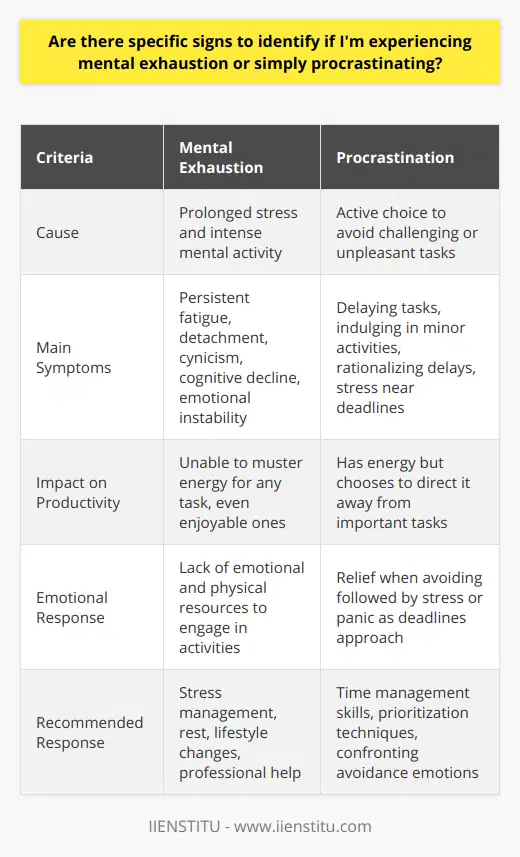
What is the difference between burnout and laziness?
Defining Burnout and Laziness
Burnout refers to a state of chronic physical and emotional exhaustion, often stemming from prolonged exposure to high levels of workplace stress. On the other hand, laziness is a lack of motivation or interest in pursuing tasks and responsibilities, usually characterized by procrastination or the desire to put forth minimal effort.
Effects on Performance
The primary difference between burnout and laziness lies in their effects on an individual's performance. Burnout generally leads to a decline in productivity, with the affected person experiencing feelings of cynicism, detachment, and hopelessness. In contrast, laziness does not necessarily involve emotional turmoil or distress, but rather, arises from an unwillingness to engage in work that demands increased attention or effort.
Root Causes
Another significant difference between the two concepts is the underlying causes. Burnout often results from factors such as excessive workloads, unrealistic expectations, or an inadequate work-life balance, ultimately undermining an individual's capacity to cope with stress. Conversely, laziness may be attributed to personal traits, such as a lack of self-discipline or a reluctance to face challenges.
Manifestations in Daily Life
Furthermore, burnout and laziness can manifest in different ways in an individual's daily life. People experiencing burnout may continue to push themselves to work at a high level, even as they experience a decline in their mental and physical wellbeing. In comparison, lazy individuals may choose to engage in leisure activities or procrastinate tasks, despite having the time and ability to complete necessary work.
Approaches to Overcoming
Finally, the ways to address and overcome burnout and laziness differ significantly. Interventions for burnout may include adjusting work hours, seeking emotional support, or incorporating relaxation strategies to mitigate stress. In contrast, overcoming laziness often requires cultivating self-discipline, setting goals, and developing a structured daily routine to promote productivity.
In conclusion, burnout and laziness both negatively impact an individual's ability to perform tasks effectively. However, they are distinct in terms of their origins, consequences, and appropriate interventions. To better understand and address the challenges presented by these phenomena, it is crucial to differentiate between the two and develop targeted approaches to improve wellbeing and productivity.
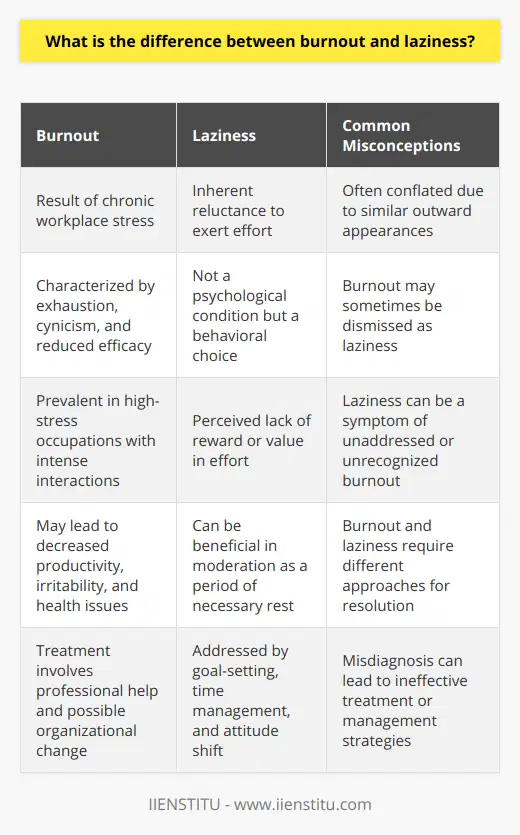
Am I lazy or mentally exhausted?
Understanding the Difference: Laziness vs. Mental Exhaustion
Identifying the cause of one's lack of motivation or energy can be challenging; however, determining whether this is due to laziness or mental exhaustion becomes essential for finding suitable solutions. Laziness is typically characterized by a lack of willingness to engage in tasks or work, often resulting from a disinterest or desire for immediate gratification. In contrast, mental exhaustion stems from an overexertion of cognitive, emotional, or physical effort, leading to feelings of overwhelm and depletion of resources necessary to perform daily activities efficiently.
Assessing Personal Experience
To differentiate between laziness and mental exhaustion, individuals should reflect on their daily experiences and emotions. If one frequently procrastinates or avoids tasks without a justifiable reason or has lost interest in activities that previously brought them joy, it may be indicative of laziness. On the other hand, if an individual has been facing increased stress, demanding workloads, or emotionally draining situations, these factors may contribute to mental exhaustion.
Effects on Productivity and Well-being
Both laziness and mental exhaustion can have detrimental effects on productivity and overall well-being. Lazy individuals may experience decreased career opportunities or personal growth due to a lack of self-discipline and initiative. Meanwhile, mentally exhausted individuals may experience burnout, compromised mental health, and strained relationships as a result of neglecting self-care and struggling to maintain daily responsibilities.
Strategies for Overcoming Laziness and Mental Exhaustion
Once an individual identifies whether they are experiencing laziness or mental exhaustion, appropriate strategies can be implemented. One can address laziness by setting goals, developing habits, and finding motivation through external rewards or personal values. Alternatively, addressing mental exhaustion requires a focus on self-care through stress management, regular breaks, adequate sleep, and finding support from friends, family, or professionals.
In conclusion, understanding whether an individual is lazy or mentally exhausted is crucial for implementing the appropriate steps to overcome these obstacles. Amidst the complexities of modern life, it is vital to be mindful of one's well-being and find suitable solutions to achieve continuous growth and personal development.

How do I know if I am lazy?
Defining Laziness
To determine if one is lazy, it is first essential to understand the concept of laziness. Laziness is typically characterized by an unwillingness to invest time and effort in a task, resulting in procrastination or minimal work input. Discerning between legitimate delay and genuine laziness requires reflection on one's motivation and work ethic.
Assessing Personal Motivation
Personal motivation is a critical factor when evaluating whether an individual is lazy. An individual who is consistently driven to accomplish goals and persistently prioritizes work over leisure is less likely to be considered lazy. Reflect on your determination to see a task through to completion, particularly when faced with challenges or obstacles.
Evaluating Time Management
An individual's time management skills also play a crucial role in determining laziness. One who often procrastinates or allows distractions to interfere with their work may be perceived as lazy. To assess your time management, consider how effectively you allocate time for tasks, maintain focus on work, and balance competing responsibilities.
Analyzing Work Ethic
A strong work ethic is associated with low levels of laziness. This involves the ability to remain disciplined, dedicated, and committed to completing tasks, even when faced with adversity or boredom. Reflect on your attitudes toward work, perseverance in overcoming challenges, and responsiveness to setbacks to measure your work ethic.
Identifying Consistent Patterns
Lastly, it is essential to recognize patterns of behavior that may indicate laziness. Exhibiting occasional reluctance or procrastination is normal; however, frequent and habitual disengagement from tasks and responsibilities may indicate an issue with laziness. Consider if these tendencies pervade various aspects of your life or if they are isolated to specific situations.
In conclusion, to determine if one is lazy, self-reflection on personal motivation, time management abilities, work ethic, and behavioral patterns is necessary. Recognizing and addressing these aspects is essential for overcoming any existing laziness and fostering overall personal growth and productivity.

Is burnout not lazy?
Burnout and Laziness: Defining the Differences
The question of whether burnout is merely a form of laziness warrants a critical examination of the underlying factors contributing to each phenomenon. Research has demonstrated key distinctions between burnout and laziness that are foundational to understanding their differences.
Burnout: A State of Chronic Stress
Burnout is a state of chronic stress resulting from prolonged exposure to workplace demands that surpass an individual's ability to cope. This stress leads to emotional exhaustion, cynicism, and reduced professional efficacy. Burnout is not a personal failing, but rather a systemic issue stemming from demanding work conditions and a lack of appropriate support.
Manifestations of Burnout
The symptoms of burnout include fatigue, irritability, difficulty concentrating, decreased job satisfaction, and a decline in overall mental health. These manifestations are distinct from laziness, as they are directly linked to the contextual factors driving burnout, such as job-related stress, excessive workloads, and a lack of autonomy.
Laziness: A Lack of Motivation
Conversely, laziness is characterized by a lack of motivation, engagement, and effort. Laziness is often a temporary state, and may stem from personal preferences, boredom, or a desire to engage in more enjoyable or stimulating activities. Laziness does not result from an excess of stress, but rather from an absence of stimuli compelling an individual to take action.
Differentiating the Two
In distinguishing between burnout and laziness, it is crucial to consider the contextual factors driving an individual's behaviors. Employees experiencing burnout will display signs of emotional and mental strain tied to work pressures, whereas those that are 'lazy' will exhibit a lack of effort and disinterest, without the accompanying stress.
Addressing Burnout
Addressing burnout requires organizational changes and supportive measures, such as providing sufficient resources, reducing workload, and cultivating a healthier work environment. On the other hand, combating laziness requires motivation, opportunity, and engagement to foster interest and commitment.
In conclusion, burnout and laziness are distinct constructs, with burnout being a pervasive and systemic issue caused by chronic work-related stress, and laziness being a temporary, individualized lack of motivation. Recognizing the unique drivers of each phenomenon is critical in order to implement appropriate interventions and uphold a productive, healthy workforce.
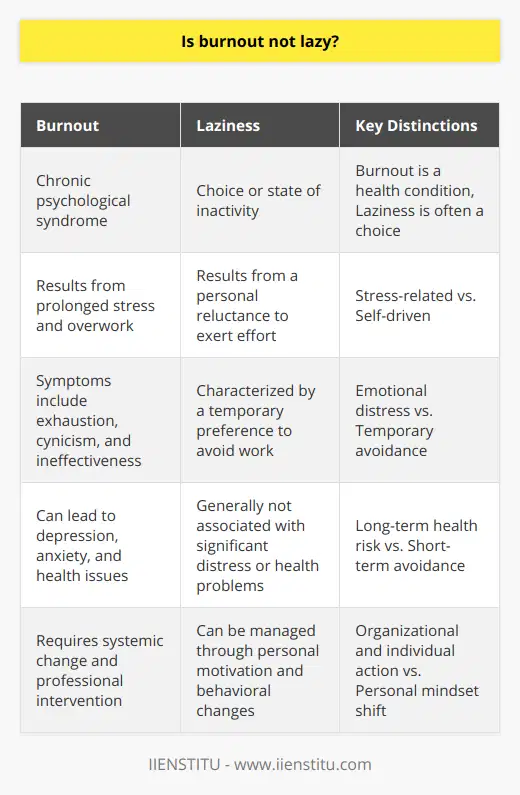
What is the difference between burnout and exhaustion?
Key Distinctions
The primary difference between burnout and exhaustion lies in their respective sources and manifestation. Burnout is a psychological phenomenon stemming from chronic workplace stress, whereas exhaustion is a physical or emotional state of extreme tiredness.
Causes of Burnout
Burnout ensues from persistent work-related stress characterized by overwhelming demands, inadequate resources, and perceived lack of support. As these stressors accumulate over time, individuals experience burnout – a state of emotional, mental, and physical exhaustion set apart by cynicism, detachment, and reduced personal accomplishment.
Causes of Exhaustion
Conversely, exhaustion arises from various causes, including overexertion, medical conditions, emotional stress, and sleep deprivation. It primarily manifests as a weariness that temporarily hinders individuals from performing daily tasks with ease. Although exhaustion shares some common symptoms with burnout, the critical distinctions lie in the causes and duration of each condition.
Effects on Work Performance
Burnout adversely impacts workplace performance through reduced productivity, increased absenteeism, and higher employee turnover rates. It can also lead to deteriorating mental health and negative implications for one's personal life. Conversely, exhaustion predominantly affects physical capacity, leading to reduced stamina, compromised cognitive function, and subsequently, diminished job performance.
Recovery Process
A crucial aspect in distinguishing burnout from exhaustion is the recovery process. Exhaustion can typically be resolved with rest, sleep, and self-care practices. However, recovering from burnout necessitates a more extensive and holistic intervention, requiring patients to reconsider their work environment, coping strategies, and beliefs about success and self-worth.
In summary, burnout and exhaustion are two distinct yet interrelated constructs, differentiated by their causes, manifestations, and recovery methods. While both adversely affect work performance, burnout is specifically rooted in persistent workplace stress and represents a more pervasive and enduring psychological condition compared to exhaustion, which is a transient state of weariness. Since both conditions can significantly impact an individual's well-being and quality of life, early detection and intervention are crucial components of effective management and prevention strategies.
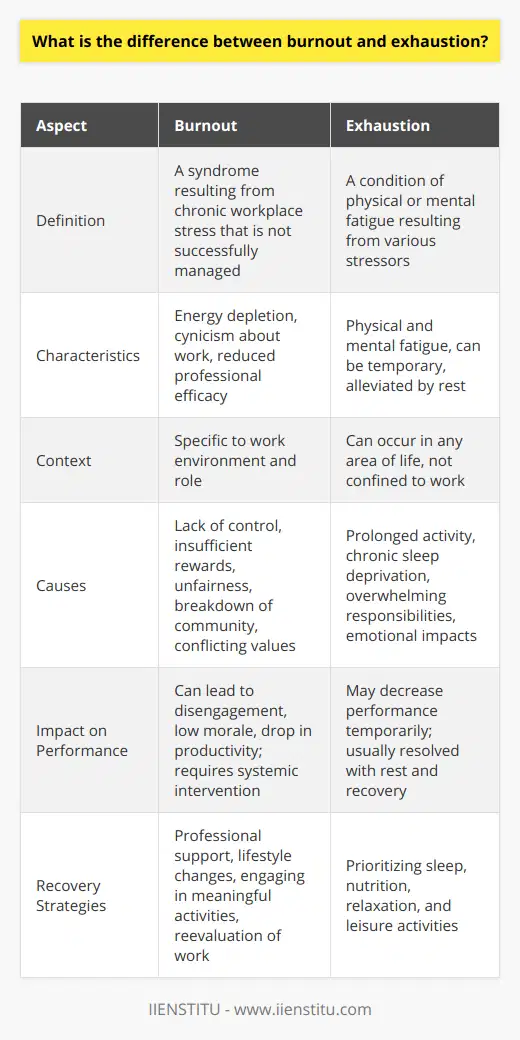
How do I know if I am experiencing burnout, or if I am simply disinterested in my studies?
Identifying Burnout Symptoms
To discern whether one is experiencing burnout or disinterest in studies, it is crucial to recognize the symptoms of burnout. Burnout occurs when prolonged stress manifests as a state of emotional, physical, and mental exhaustion. Identifying burnout symptoms can prevent further adverse effects on one's well-being.
Physical and Emotional Signs
Some common physical symptoms of burnout include constant fatigue, headaches, muscle tension, and sleep disturbances. On the emotional front, individuals experiencing burnout may feel overwhelmed, helpless, or trapped in a negative mental loop. Frequent mood swings, irritability, or feelings of worthlessness are other indicators of burnout.
Motivation and Cognitive Effects
A more apparent sign of burnout is a continuous decline in motivation levels. Burnout can lead to an inability to concentrate, poor decision-making, and reduced creative thinking capacity. If your academic performance has suffered significantly despite consistent efforts, burnout might be the underlying cause.
Disinterest in Studies
Disinterest in studies, on the other hand, can manifest as a lack of enthusiasm or curiosity about the subject matter. This could stem from inadequate prior knowledge, boredom, or an absence of intrinsic motivation for that particular subject. Differentiating between burnout and disinterest can be ascertained by examining one's overall academic performance and interests.
Analyzing Personal Factors
Consider personal factors contributing to your current state of mind. Are external responsibilities, such as a part-time job, affecting your ability to engage in studies? Are you experiencing personal or family issues that might be impacting your mental well-being? Reflecting on these aspects can offer insights into whether the issue is burnout or a lack of interest in studies.
Taking Action
After identifying the cause, one should take appropriate measures to address the situation. If you suspect a lack of genuine interest in your studies, consider reevaluating your academic and career goals. If burnout is the primary concern, employing stress management techniques or seeking support from professionals can aid in recovery and prevention.
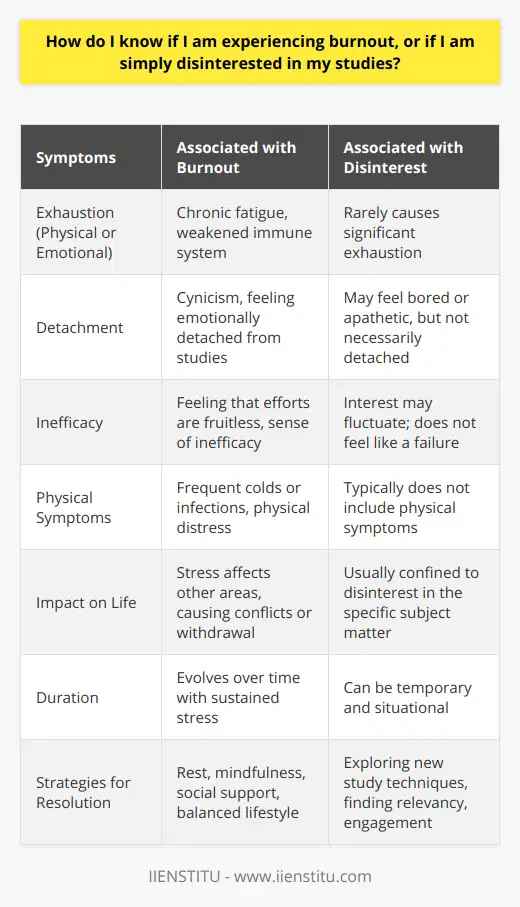
Is burnout not lazy?
Burnout as a Genuine Issue
Burnout is often misconstrued as laziness, but it is essential to differentiate between the two. Laziness represents a lack of motivation or unwillingness to exert effort, whereas burnout is a state of chronic physical and emotional exhaustion resulting from prolonged exposure to stress and overwork. Various factors contribute to burnout, including excessive workload, lack of control over one's job, and insufficient reward for the invested effort.
Consequences of Burnout
The consequences of burnout can be detrimental to one's personal and professional life. Burnout can lead to a decline in job performance, increased absenteeism, and even severe mental and physical health issues. Experiencing burnout may also result in a reduced capacity to cope with stressors, rendering the individual more susceptible to future burnout episodes. Thus, burnout represents a significant concern that should not be dismissed as laziness.
Prevention Strategies
Preventing burnout involves addressing its root causes. Individuals can benefit from setting realistic goals, delegating tasks, and maintaining a work-life balance. Regular exercise, sufficient sleep, and healthy nutrition are crucial for maintaining physical and emotional well-being. Employers can play a significant role in preventing burnout by fostering a supportive work environment, providing ample resources for employees, setting realistic expectations, and recognizing the efforts and achievements of their workers.
Recognizing Burnout Early
Early detection of burnout is crucial to prevent its progression. Signs of burnout may include chronic fatigue, irritability, feelings of inadequacy, and a reduced sense of accomplishment. Being aware of these symptoms and taking proactive steps to address them can reduce the impact of burnout and promote a healthier, more sustainable work-life model.
In conclusion, burnout is a genuine issue separate from laziness, and it is crucial for individuals and employers to recognize its signs and work collaboratively to prevent its onset. As the modern work environment continues to evolve, addressing burnout will be increasingly important for maintaining productivity and employee well-being.

What is the difference between burnout and exhaustion?
Defining Burnout and Exhaustion
To understand the distinction between burnout and exhaustion, it is vital to define these terms independently. Burnout refers to a state of chronic emotional, mental, and physical fatigue resulting from prolonged work-related stress. It is characterized by feelings of detachment, decreased engagement, and reduced motivation that impairs overall performance. In contrast, exhaustion is a temporary state of extreme tiredness that may stem from various sources, such as lack of sleep, physical exertion, or mental strain.
Contributing Factors
Factors contributing to each condition differ; burnout develops due to persistent stress, often stemming from work, although other areas like caregiving can contribute. This stress accumulates when demands surpass an individual's ability to cope, leading to emotional and physical depletion. In contrast, exhaustion is not specific to the occupational sphere and can arise from any circumstance in which the body and mind are pushed past a certain threshold.
Manifestation of Symptoms
Another divergence is the manifestation of symptoms. Burnout is not only physical tiredness but also involves emotional and mental weariness, including feelings of cynicism, disillusionment, and ineffectiveness in one's professional role. This negative emotional state perpetuates, causing decreased productivity, emotional numbness, and increased job dissatisfaction. Exhaustion, on the other hand, is primarily characterized by physical symptoms such as fatigue, muscle weakness, and difficulty concentrating. The primary distinction lies in the duration and accompanying emotional symptoms.
Long-term Consequences
The long-term consequences of burnout and exhaustion also differ, with burnout potentially causing more severe outcomes if left unaddressed. Since it is rooted in chronic stress and emotional depletion, burnout can lead to mental health issues such as depression and anxiety, immune system dysfunction, and increased susceptibility to physical illness. Meanwhile, exhaustion, being a temporary state, usually resolves once an individual has had sufficient rest and recovery.
Strategies for Prevention and Recovery
Lastly, strategies for preventing and recovering from burnout and exhaustion vary. Combating burnout often involves addressing the underlying causes of work-related stress, such as unrealistic expectations, inadequate support, or insufficient boundaries in one's role. This may entail cultivating better work-life balance, seeking social support, and developing healthy stress-management strategies. Recovery from exhaustion typically involves ensuring ample rest, proper nutrition, and effective coping mechanisms for future stressors.
In conclusion, burnout and exhaustion are distinct conditions with unique symptoms, contributing factors, and consequences, despite sharing some overlaps in manifestation. Recognizing these differences is crucial for implementing effective prevention and intervention strategies.

What is the difference between lazy and unmotivated?
Defining Lazy and Unmotivated
Lazy and unmotivated are terms frequently used interchangeably, yet they represent distinct psychological concepts. Laziness refers to a person's reluctance or resistance to performing tasks or making efforts, stemming from a preference for relaxation and idleness. In contrast, a lack of motivation (or being unmotivated) highlights an individual's absence of enthusiasm or curiosity to pursue a particular goal, oftentimes arising from various internal or external factors.
Causes of Laziness vs. Lack of Motivation
Different factors contribute to individuals being lazy or unmotivated, which significantly distinguishes the two concepts. Laziness typically arises from a preference for immediate gratification, comfort, or pleasure over more challenging and demanding tasks. In fact, individuals might prioritize tasks that are easier to accomplish, thereby avoiding tasks that require more effort or focus.
On the other hand, motivation loss could stem from numerous sources, such as lack of interest, perceived inadequacy, or overwhelming stress. Moreover, external factors may come into play, for instance, lack of support, negative feedback, or insufficient rewards. Unmotivated individuals might actually be willing to exert effort but may not see the value or find the inspiration to pursue a specific objective.
Observable Behaviors and Implications
The distinction between laziness and a lack of motivation is further highlighted through observation of individuals' behaviors and attitudes. Lazy individuals tend to knowingly avoid tasks that demand effort and show no initiative in accomplishing them. They may postpone or procrastinate, rationalizing their inefficiency by claiming to be tired or uninterested.
In contrast, unmotivated individuals could potentially exhibit different behaviors, such as repeated failure to achieve goals, lack of self-confidence, or inability to set realistic expectations. Their absence of motivation may signal a need for emotional or psychological support, as well as the possibility of an underlying issue that hinders goal attainment.
Conclusion
Although lazy and unmotivated may be closely related, they represent unique concepts with separate causes, manifestations, and implications. To better understand and appropriately address an individual's state of inactivity or unproductivity, it is crucial to correctly identify whether the person is truly lazy or simply unmotivated. By distinguishing between these two states, targeted strategies, interventions, or support systems can be implemented to effectively help individuals overcome their challenges and reach their potential.
